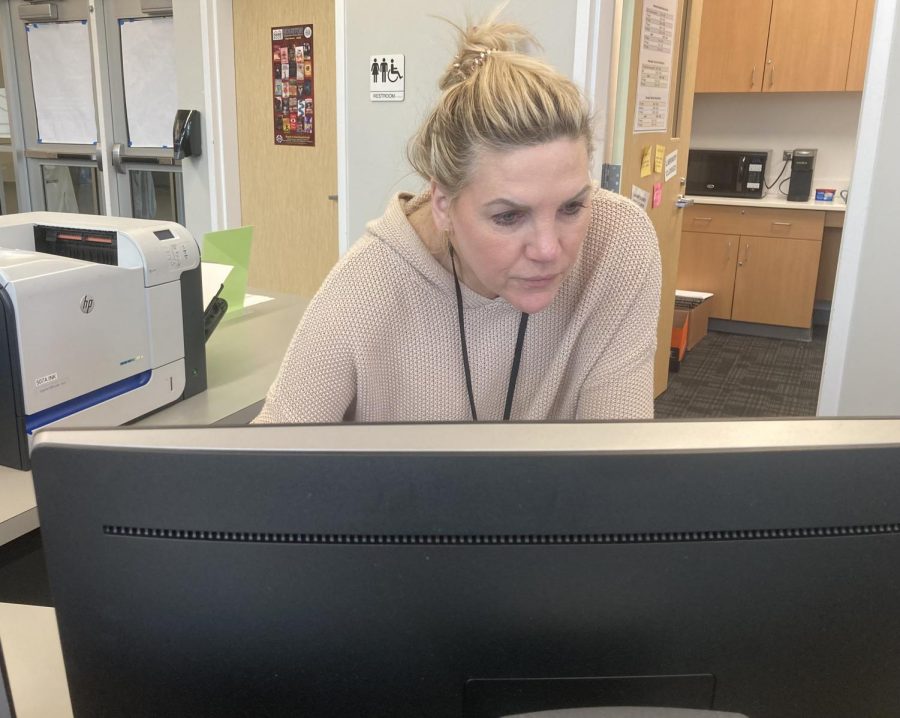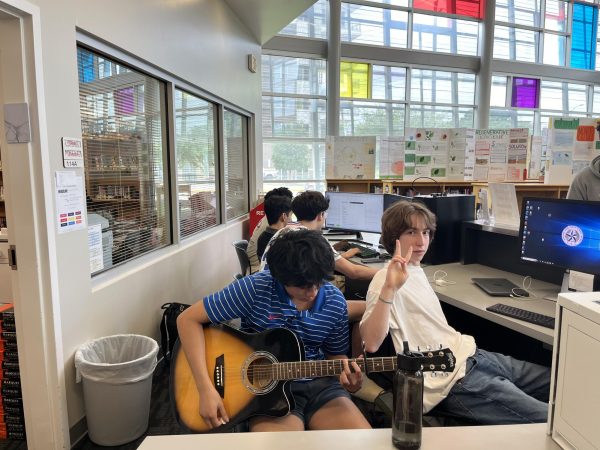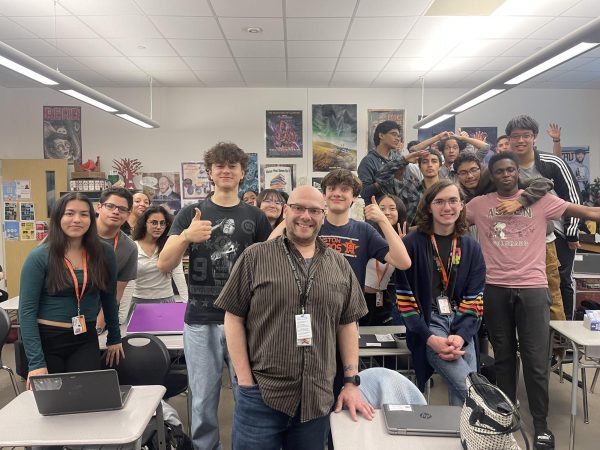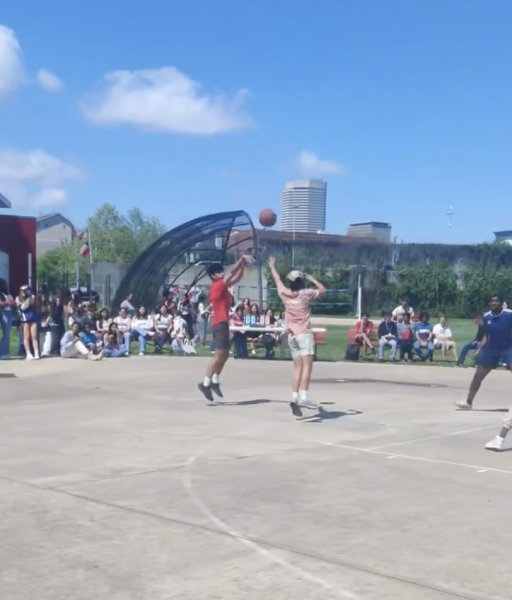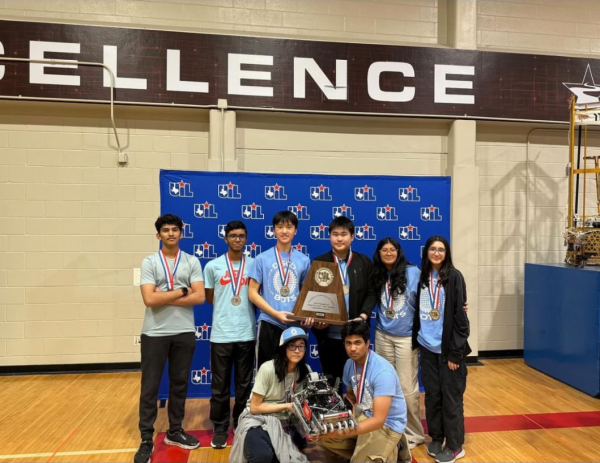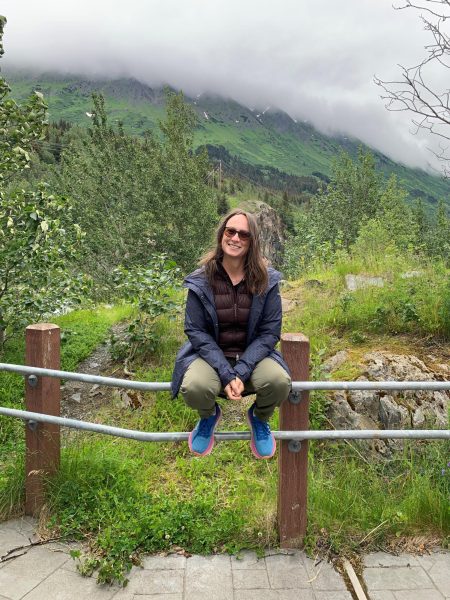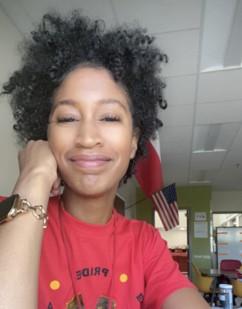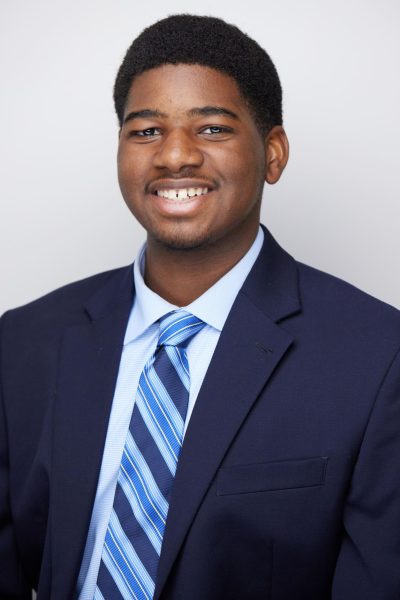Librarian Cindy Schulze affirms the principles of equity, diversity and inclusion for the school library
Ms. Schulze searching up a book in our library’s database
Working as an educator in Texas for over 20 years, librarian Cindy Schulze, is always down for talking about anything book-related. Even though she is still catching up on her young adult book knowledge, she always has an idea of what books to recommend to students and what books to add to the library.
Every year, Schulze reorganizes and orders new books for the students at Carnegie to check out and enjoy. In recent years, however, the number of books being banned or challenged has been rising in Texas and many other states. Although it doesn’t seem to affect Carnegie much, Schulze thinks it’s still extremely important that all students have access to books and resources that will help them learn and grow, just as she did when she was younger.
Although Schulze didn’t start reading books until college, she realized very quickly that she was falling in love with reading.
“I was not a big reader growing up, and my parents weren’t readers,” Schulze said. “I read children’s books, you know, but I didn’t really read novels until college.”
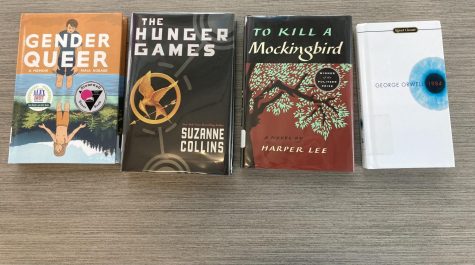
Her favorite types of books to read are realistic fiction, since they’re relatable to her, and she can see herself in the story.
“I can’t relate to Harry Potter, the fantasy.” Schulze said. “I don’t enjoy those [fantasy novels] because there’s room for those in my head, but I really enjoy a romance novel or something I can relate to.”
Katherine Center, a local author, is one of Schulze’s favorite authors. Schulze is currently enjoying The Bodyguard, a New York Times bestseller written by Center.
“I would definitely bring one of her books [to a deserted island],” said Schulze. “They’re starting to make movies [based on the books], and they’re generally romance novels.”
Other than reading, Schulze makes jewelry in her free time. Before that, however, she had originally planned to become a teacher.
“I wanted to be a teacher. All my life, and then when I got into teaching, it wasn’t what I had expected,” Schulze said. “And I was in a very tough school. I found my peace in the library. So, when I was in my classroom, I’d always hang out with the librarians.”
Schulze realized that she wanted to become a librarian, which took her to a private school with both middle school and high school age groups.
“That was middle school and high school.” Schulze said. “And I found a real love for high school students at that point, and I thought, ‘I will never teach anything else.’ And then the job here [at Carnegie] opened up, and I love it. I just love getting to know the kids, and I love talking about books. I love [the] students here. They’re respectful.”
Specifically, at Carnegie, the environment allows for students to appreciate the diversity of books that can be found in the library. Realistic fiction, romance novels and manga are a few of the countless genres that students can check out from the library.
“I buy [books] the kids want to read and what’s popular,” Schulze said. “I have a little row of graphic novels; the students really love the manga. What’s also interesting about the graphic novels too is it’s also non-fiction books [that students check out]. It’s every genre that can be put into a graphic novel.”
As librarians, we are taught that the First Amendment [means] freedom of speech, the right to information [and] intellectual freedom. Equity, Diversity, Inclusion; to be able to have access to information, any information you want to have access to.
— Librarian Cindy Schulze
Texas has specific standards for which books should be included in a school library’s collection. Schulze used a fund given to the library by HISD, called the ESSER fund, to replace the majority of the books at the library for the new school year. Schulze emphasizes that she buys books for the library based on what is popular with students, even if some of these books are banned or challenged.
“What’s exciting about this year is [that] we got a huge budget from the district. It was a fund, and it was called the ESSER fund, and it had to do something with COVID. Every single library in the district got money to replace their collection or make their collection up to standard because Texas has standards for how many books you should have in your library per number of students and how old the books should be,” Schulze explained. “But books are starting to be checked out more because we have new books in the library. And so now I’m having students come in and check out books.”
In recent years, there has been a spike in book bans across the country, but data shows that Texas is the most affected, with 801 book bans in 22 districts. Despite this, books such as To Kill a Mockingbird, The Giver and 1984 can still be found between the filled shelves in the library.
“One of my favorite books of all time is The Giver by Lois Lowry. It’s a banned book,” Schulze said. “It’s dystopian, and they have all these rules in society. And one of [these rules] is if a baby’s born and if it has any problems, they discard the baby. And it’s a big issue for that book.”
According to Schulze, there have been book bans for a long time and they won’t stop anytime soon.
“Oh man. [The book bans are] never ending. [They] started with a classic. [There are] new classic book bans [every year]. There’s always been books that deal with anything that’s controversial, like topics like abortion. It’s kind of gotten bigger with the LGBTQ [books], there’s a lot of books that are written about that. The bans have increased a little bit because of that,” Schulze said. “I’ve never been one to be like, ‘oh, let’s celebrate all the banned books because there’s so many.’”
Schulze doesn’t take ban status into account when buying books for the library. She is ready to ensure that every student has access to the information they need amid the growing number of books and resources being challenged.
“As librarians, we are taught that the First Amendment [means] freedom of speech, the right to information [and] intellectual freedom. Equity, Diversity, Inclusion; to be able to have access to information, any information you want to have access to. And I just feel like if parents just like read [the descriptions of] our movies or what they watch on TV, if parents don’t want their students to read certain things, that’s up to them. But we, anybody, should have the right to be able to go to a library and find information on anything and everything.”
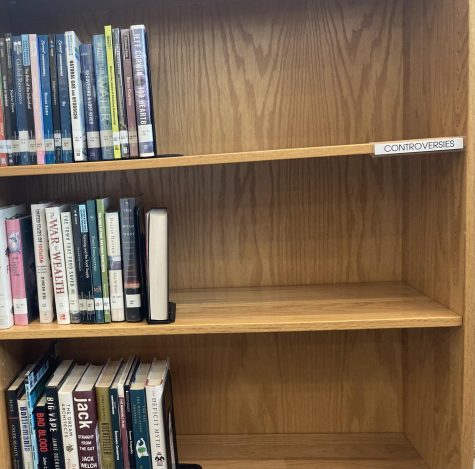
An example of the way information is given to students through the CVHS library is the research databases where students can get information about any non-fiction topic.
“It’s [a part of] my job to get information out to students and let them know that [the databases], exist because we don’t typically buy a lot of nonfiction books anymore, because by the time nonfiction books are published, a lot of times [they’re] irrelevant. [The databases are] basically printed material put into electronic format,” Schulze said.
Schulze also happily promotes lesser-known authors, whose books she loves to recommend to students who may not know what to read.
“I like to support authors that I know. And my sister-in-law, in the last few years, became a young adult author. Her name is Samantha Mabry, and we have all of her books in the library. So, I like to promote her books… and they’re good, but she’s just not really well known,” Schulze said.
Amid the trend of banned books rising in the United States, the school library is thriving, and students may just find themselves picking up and enjoying a book that was challenged by another district or state.
Your donation will support the student journalists of Carnegie Vanguard High School. Your contribution will allow us to cover our annual website hosting costs and fund field trips, competition fees, and equipment. We appreciate your support!
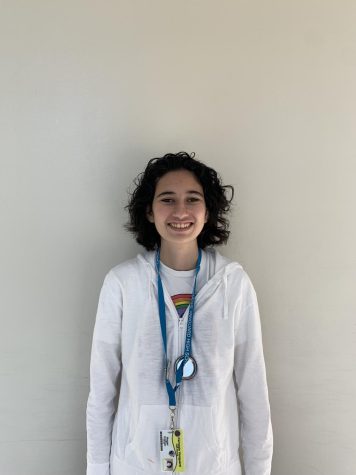
Hagar enjoys expressing herself through writing, but also through admiration of the fine arts as a whole. She sees it as a way to show how she is feeling...

